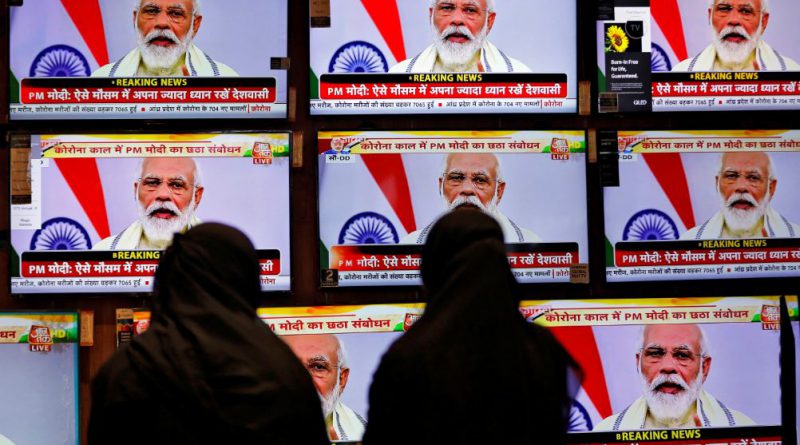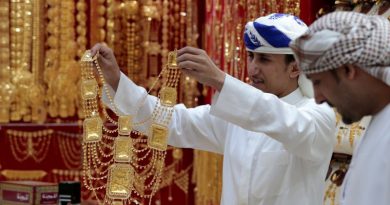Modi’s BJP courts India’s rising election power: Women
Reuters
For the BJP, winning the hearts and minds of women voters is central to its growth strategy to stave off electoral stagnation after a decade in power and cement its dominance at the ballot box,
Ranika Jaiswal’s family in Varanasi has boasted a string of officials in India’s ruling BJP party over the last four decades. Now she wants a piece of the action.
“Three generations of my family, all men, have been with the party. But now it’s changing – as a woman I am also equally invested,” said the 48-year-old, who is seeking the support of party officials to stand as a lawmaker from Uttar Pradesh in the 2024 national election. “I think it’s critical for more female candidates to contest.”
Decades after Prime Minister Narendra Modi’s Bharatiya Janata Party (BJP) was born from a Hindu nationalist organisation dominated by men, its sustained electoral gains depend on women, the rising power of Indian elections.
Women’s turnout at national elections surged from 53% in 2004 to 67% in 2019 – a historic moment when it edged ahead of men’s percentage turnout for the first time – and next year is projected to rise further to about 69%, according to officials at the Election Commission of India.
India is changing apace – though you wouldn’t guess from a glance at parliament. The country’s nearly 700 million women are still stuck on the sidelines of political decision-making, making up about one in 10 national and regional lawmakers.
For the BJP, winning the hearts and minds of women voters is central to its growth strategy to stave off electoral stagnation after a decade in power and cement its dominance at the ballot box, according to Reuters interviews with 10 officials in the party, including ministers and federal lawmakers.
Failure could cede ground to its arch rival Congress, the party of former premier Indira Gandhi and her daughter-in-law Sonia Gandhi, as it seeks momentum for a comeback.
The representation gap is one stark example of the deep inequalities still facing women in India, the world’s most populous nation, where equality advocates say a deeply entrenched patriarchy has defied the rapid pace of economic development and modernisation.
Women have a raw deal from birth. Female newborns – considered of lower value by some families – are more likely to die than male babies, while girls are more likely to drop out of school than boys, according to the UNICEF. The unevenness runs all the way to corporate boardrooms, where women made up fewer than one in 20 CEOs in 2021, a Deloitte report found.
Increasing the number of women in India’s corridors of power will “definitely be a game-changer” electorally and socially, said Vanathi Srinivasan, the lawmaker chosen by Modi to lead the BJP’s charge towards equal representation.
The BJP aims to nominate women candidates for about a third of the 543 seats that will be up for grabs in the lower house of parliament in the summer of 2024, she told Reuters, detailing plans that haven’t been previously reported.
The party also plans to recruit more than 900 women into positions within its internal staff, seeking to have at least one-third female representation at every level of management, Srinivasan added, with the jobs coming from a combination of new roles and those vacated by retirees.
A key gauge of success will be whether the BJP can improve on its lopsided record, with only 42 women currently among its 303 MPs in the lower house.
“Despite economic growth, Indian women’s participation in the country’s politics has not kept pace,” said Christophe Jaffrelot, a professor of Indian politics and sociology at King’s India Institute in London.
“The BJP will have to prove that they really believe in giving women political opportunity, the numbers will do the talking.”
Some critics of the BJP also say that if it was fully committed to equality, it could pass a bill to reserve a third of seats in the lower house of the parliament for women before the 2024 election, as it enjoys a majority. The party declined to comment on this option.
Internal Report : Women Despondent
The BJP’s equality overhaul has been informed by private polling conducted by the party which found the rising female voter turnout was driven by increased political awareness among women in both rural and urban areas, according to Srinivasan.
“Thousands of female voters during the survey stated they felt despondent as women were given a smaller share in power despite making a significant economic contribution,” said the 52-year-old, who declined to go into further detail on the report’s findings because they are confidential.
Reuters interviews with six other senior women politicians in the BJP identified the biggest roadblock to change as a lack of will among socially conservative party officials at state and district level, where politicians typically begin their careers.
They said the issue had become apparent in the run-up to a string of elections for state assemblies being held this year, adding that on several occasions Modi and other national leaders had scrapped candidature lists that didn’t include any women.
Phangnon Konyak, who became the first female lawmaker in the upper house of parliament from the northeastern state of Nagaland last year, said that during the selection process local political leaders often questioned her ability to focus on the election because she is a single mother.
The men would often ask her, “Why don’t I sit at home, take care of my child or get married?”
“The battle is intense for parties to prove to us women that we stand a chance of securing senior positions,” Konyak added. “At times the game is rigged by insiders who don’t want women to take leadership roles.”
Hekani Jakhalu, Nagaland’s first female state lawmaker, concurred. She said it was tougher for women to convince local party officials that they were a good bet for selection.
“Let me just say, women with political ambition have to work enormously hard to prove their commitment and leadership.”
BJP Born From Right-Wing Group
The BJP’s national president J.P. Nadda told Reuters that empowering women and harnessing female talent was central to the party’s growth strategy. This was echoed by an official in Modi’s office, who said the prime minister saw improving gender balance as integral to governance.
“We have been asked to encourage every department to start making gender balance as part of a long-term reform,” said the official, a secretary in Modi’s office in New Delhi.
Indeed Modi, 72, is going big on equality, stressing last month that India could only develop as a nation by evening out representation in all walks of life: “All of you must move ahead with the determination to remove every obstacle before women, sisters and daughters,” he told a conference.
It’s a stark reversal for the BJP, a party that emerged in India’s post-Independence years from the Rashtriya Swayamsevak Sangh (RSS), a right-wing Hindu organisation that was almost exclusively a bastion of upper-caste Hindu men.
Nonetheless, leaders of the BJP and other parties said they recognised the need to address a growing disenchantment among women voters about the lack of representation.
Janaki Prakash, a voter in New Delhi, said very few women were given tickets in elections at local or federal level.
“We are appreciated for casting votes and turning out in high numbers, but when it comes to giving us a fair share in politics and governance, then we are offered a raw deal,” said the 42-year-old, a professor of Hindi literature.
“Representation and diversity are still symbolic.”
In the Kishanganj district of the impoverished eastern state of Bihar, health worker Pratima Kumari said supporting female politicians was an important way to ensure policies aimed at women empowerment. She offers free condoms and birth-control pills and talks to couples about family planning and the benefits of having just two children.
“The fact that more women are voting in large numbers proves that we are ensuring our collective voice gets heard and recognised,” she added.
The main opposition Congress party, which ruled for about half a century before it lost power to the BJP in 1996, hopes a rising number of female voters will help it claw back electoral ground lost over the past two decades.
It believes it has less work to do than the BJP in convincing women voters of its commitment to equality because of its leadership record. The party gave India its first female prime minister – Indira Gandhi who served until her assassination in 1984 – while Sonia Gandhi was the party’s longest-serving president before she retired last year.
“The Congress party has believed in organic growth but the BJP has historically focused on male leadership,” said Netta D’Souza, president of Congress’ women’s wing. “Our party tracks conviction of any candidate regardless of their gender.”



